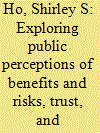|
|
|
Sort Order |
|
|
|
Items / Page
|
|
|
|
|
|
|
| Srl | Item |
| 1 |
ID:
166316


|
|
|
|
|
| Summary/Abstract |
Understanding public perception is critical to developing effective policies for nuclear energy. This study conducted focus group discussions with the Thai and Vietnamese public to understand their trust in potential stakeholders, benefit perception, risk perception, and acceptance of nuclear energy. The participants in both countries preferred economic benefits, such as boosting national development to environmental benefits. Participants perceived nuclear accidents as a major risk, but such perceptions were sometimes based on misunderstandings. The findings suggested that participants evaluated trust toward relevant stakeholders based on their expertise, transparency, and empathy. Overall, participants indicated that their respective countries were not ready for nuclear energy: The Thais thought that their government should heighten public education on nuclear energy, while the Vietnamese thought that their country lacked expertise for managing nuclear power plants. This study also highlights the theoretical and policy implications for nuclear energy development in Southeast Asia. Directions for future studies were discussed.
|
|
|
|
|
|
|
|
|
|
|
|
|
|
|
|
| 2 |
ID:
177405


|
|
|
|
|
| Summary/Abstract |
Nuclear energy is an important consideration for decarbonisation. However, for Singapore – a country at the nascent stage of nuclear energy development – the building of a nuclear research reactor could be a precursor to a full-fledged nuclear energy plan. Guided by the cognitive miser model and the knowledge deficit model, this study examines factors shaping public support for the use of a nuclear research reactor for medical purposes. In particular, we seek to understand how different types of knowledge could affect public support for the use of a nuclear research reactor in an island city-state. Based on the data from a nationally representative door-to-door survey of 1000 adult Singaporeans, we found that the public mainly depend on heuristics, such as religiosity, benefit perception, and trust in relevant authorities, to form attitudes towards the use of a nuclear research reactor, revealing a tendency to employ mental shortcuts for decision making. More importantly, we found that heuristics moderated the effect of contextual nuclear knowledge on public support for the use of a nuclear research reactor. This indicates that individuals might interpret the same information differently, depending on their firmly held beliefs or pre-existing perceptions.
|
|
|
|
|
|
|
|
|
|
|
|
|
|
|
|
|
|
|
|
|